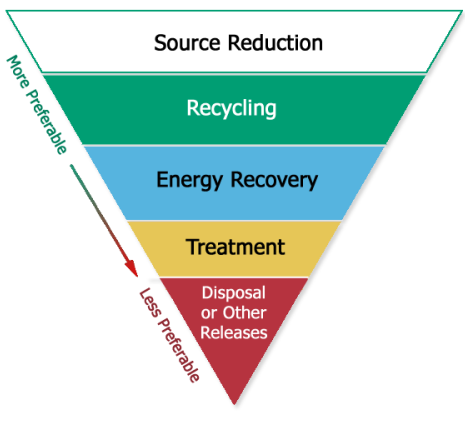Production Related Waste Management for Selected Chemical
lchemid=0000101144
Waste Management Comparison - 2022
Pollution Prevention Activities for Selected Chemical
| Reporting Year | Section 8.10: Newly Implemented Source Reduction Activity | Section 8.10: Methods to Identify Activity | Section 8.11: Optional Pollution Prevention Information* |
|---|---|---|---|
| 2014 |
Barriers: B3-Barriers to P2 B3 - Concern that product quality may decline as a result of source reduction.
|
Barriers to P2: B3 - Concern that product quality may decline as a result of source reduction. - Some products yellow over time, which is undesirable to customers. |
|
| 2012 |
Source Reduction:: W52: Modified equipment, layout, or piping
|
Methods to Identify SR Opportunities: T01: Internal pollution prevention opportunity audit(s)
Methods to Identify SR Opportunities: T04: Participative team management Methods to Identify SR Opportunities: T10: Vendor assistance |
|
| 2011 | Other Environmental Practices - Substitution of a less toxic alternative is being evaluated. Alternative process handling equipment (auger feed) is expected to be implemented to replace vacuum conveying and is expected to reduce fugitive air emissions. | ||
| 2006 |
Source Reduction:: W21: Instituted procedures to ensure that materials do not stay in inventory beyond
Source Reduction:: W32: Improved procedures for loading, unloading, and transfer operations Source Reduction:: W42: Substituted raw materials |
Methods to Identify SR Opportunities: T07: State government technical assistance program
Methods to Identify SR Opportunities: T04: Participative team management Methods to Identify SR Opportunities: T04: Participative team management |
Other Environmental Practices - In 2005 & 2006 Globe Composite Solutions dramatically reduced on-site inventories of its Form R and other potentially hazrdous materials while eliminating numerous unwanted and out-of-specification materials. Additional toxic use reduction efforts led to significant reductions in byproduct generation while experiencing moderate production efficiency increases. Globe Composite Solutions looks to build upon this success in 2007. |
| 2005 | Other Environmental Practices - 4,4'-Methylenebis(2-Chloroaniline) usage is a function of production as an article component. No substitutions are currently commercially available, though advancements in the safe design and use of the aaforementioned material have been implemented. Globe composite solutions, takes its environmental, health and safety responsibilities very seriously and actively works to reduce the byproduct generation and fugitive release of the material through the process. | ||
| 2004 |
Source Reduction:: W13: Improved maintenance scheduling, recordkeeping, or procedures
|
Methods to Identify SR Opportunities: T03: Materials balance audits
Methods to Identify SR Opportunities: T10: Vendor assistance |
|
| 2002 |
Source Reduction:: W19: Other changes in operating practices
|
Methods to Identify SR Opportunities: T01: Internal pollution prevention opportunity audit(s)
|
|
| 2001 |
Source Reduction:: W13: Improved maintenance scheduling, recordkeeping, or procedures
|
Methods to Identify SR Opportunities: T01: Internal pollution prevention opportunity audit(s)
|
|
| 2000 |
Source Reduction:: W19: Other changes in operating practices
|
Methods to Identify SR Opportunities: T01: Internal pollution prevention opportunity audit(s)
|
|
| 1997 |
Source Reduction:: W13: Improved maintenance scheduling, recordkeeping, or procedures
|
Methods to Identify SR Opportunities: T01: Internal pollution prevention opportunity audit(s)
|
TRI Pollution Prevention Glossary
The Waste Management Hierarchy |
The waste management hierarchy established by the Pollution Prevention Act (PPA) guides waste generators toward the best options for managing wastes.
The preferred option is to prevent pollution at its source, but for waste that is generated, the preferred management methods are recycling, followed
by burning for energy recovery, treatment and, as a last resort, disposing of the waste.
|
- A breakdown of production-related waste managed. This includes all amounts of the chemical released directly to the environment or otherwise managed as waste, other than waste generated by one-time events not associated with normal production processes (e.g., fires or remedial actions).
- A production ratio or activity index to provide context for reported toxic chemical quantities. For example, if a chemical is used in the manufacture of refrigerators, the production index would track the number of refrigerators produced and could be used to help gauge how much of the chemical is being released per unit of production.
- Any newly implemented source reduction activities, reported using "W-codes" (e.g., "W41: Increased purity of raw materials")